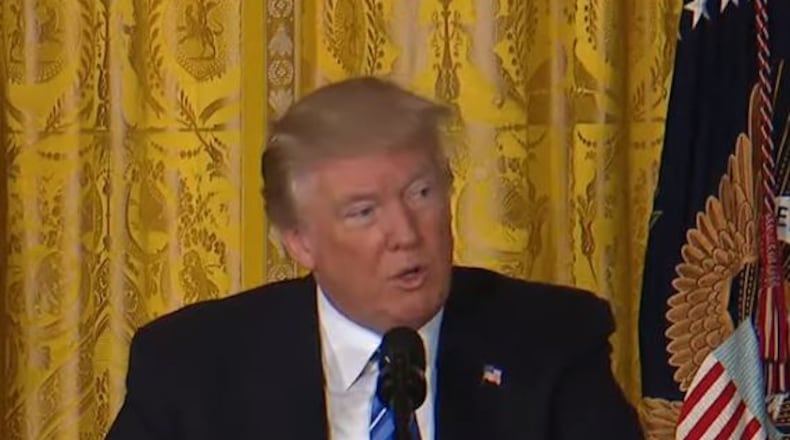The admission by President Donald Trump's oldest son that a June 2016 meeting between top Trump campaign officials and a "Russian government attorney" was focused on possible dirt on Hillary Clinton, added new fuel to the investigation into Russian interference in the 2016 elections, as Democrats swiftly called for Donald Trump Jr. and others to testify in public about the meeting, and any other Russian contacts.
The email to Trump Jr. promised information that would "very useful" to Mr. Trump in his campaign against Clinton, as it provided some of the first direct evidence of Russian contacts by a top official in the Trump camp.
Here is a look at what changed with the release of information on that meeting.
1. Trump blanket denial punctured by son's emails. For months, critics of the investigation into possible links between the Trump campaign and Russian operatives had been fairly straightforward and simple - there was no evidence, absolutely no evidence of any meetings, any ties, any communication of any sort. That ended when the Trump Jr. emails were released on Tuesday morning, showing a meeting in June 2016 that had been arranged for Trump Jr., Jared Kushner and Paul Manafort. The meeting agenda was clear from the email - "information that would incriminate Hillary," which was "part of Russia and its government's support for Mr. Trump."
Credit: Jamie Dupree
Credit: Jamie Dupree
2. Trump Jr. didn't tell the truth to the New York Times. It's not illegal to lie to the New York Times, but it shouldn't be papered over, either. When originally asked about the meeting for a story on Saturday, Trump Jr. said it had been about adoption policies involving the U.S. and Russia. But when the emails were released, they painted a much different story. The subject line read: "Russia - Clinton - private and confidential." The word adoption was nowhere to be found in the email chain, which included Trump Jr. forwarding it to Manafort and Kushner.
Credit: Jamie Dupree
Credit: Jamie Dupree
3. Questions raised about other denials of Russia meetings. We have now seen multiple examples of top Trump officials and family members publicly saying they never had Russian contacts or meetings, only to have that get changed later on by an admission that it did happen. Michael Flynn, Jared Kushner, Attorney General Sessions and others have had to amend their original statements about Russia-related contacts. President Trump said at one point that no one on his team had contacts with Russians. Those denials have not lasted for some key aides.
4. Trump Jr. emails "creates a string to pull on." A few weeks ago, Republicans seemed more confident that President Trump would be able to ride out any storm related to the Russia investigation, as Mr. Trump tried to turn the focus more on the response to Russian interference in the elections by the Obama Administration. But that internet bravado was nowhere to be seen in the last four days as the Trump Jr. story slowly emerged in the New York Times. The story energized Democrats, who have long doubted that they were getting a full explanation.
5. Trump Jr. emails create some fire on Fox News. Even on the network that has been the most friendly to President Trump, there were sharp questions raised by analysts about the Trump Jr. emails, and the acknowledgment that he had warmly received the idea of getting dirt on Hillary Clinton from an attorney with links to the Russian government.
Not only was Charles Krauthammer seeing red over the Donald Trump Jr., story, but things also boiled over on Tucker Carlson's show, as he got into it with Fox News analyst Ralph Peters. After Carlson said it was "hard to see why" Vladimir Putin and Russia is a threat to the United States, Peters compared Carlson to Charles Lindbergh and his "America First" opposition to confronting Hitler and the Nazis.
The issue of the Russia probe seems likely to be raised on Wednesday, when the Senate Judiciary Committee holds confirmation hearings for President Trump's nominee to head the FBI, Christopher Wray.
About the Author
The Latest
Featured





